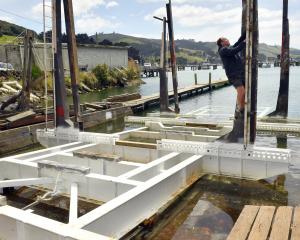
Cold Gold Clutha Ltd (CGC) sought resource consent to suction-mine for gold from the Luggate Bridge to the confluence of the Clutha and Lindis Rivers — about 23km.
The company wanted to use a suction dredge that was a self-powered steel pontoon catamaran 23.9m long with a beam of 6.6m.
Consents were required from the Otago Regional Council, the Central Otago District Council and the Queenstown Lakes District Council.
Commissioners Craig Welsh, chairman Rob van Voorthuysen and Jane Sinclair heard submissions in Cromwell in November and on Wednesday released a joint decision for all three councils.
Submitter and Tarras resident Dr Marilyn Duxson said she was delighted with the decision.
Issues that concerned submitters had included river users’ safety, health of the trout fishery and lack of protection for taonga species, Dr Duxson said.
The proposed dredge anchor wires, which would protrude into the river flow, had been raised as a hazard by QLDC harbourmaster Phil Weil.

"It would have been a disaster having those wires spanning the river."
People using the river and walking tracks, as well as those like her who lived near it, would all have been disadvantaged, she said.
"The downside far outweighed possible benefit to the community."
CGC director Peter Hall could not be contacted for comment yesterday.
However, six months ago, he said there were more regulations than the company had anticipated to move the dredge to the Upper Clutha.
The "sheer bureaucracy" was difficult, he said.
In her closing submission, CGC lawyer Bridget Irving said if the consent was declined the company had a "plan B" to use smaller, permitted dredges to recoup the cost of obtaining the mining permit.
ORC consultant planner Josie Burrows and CODC and QLDC consultant planner Kirstyn Royce had both recommended the application be declined.
The commissioners agreed there would be adverse effects from granting the consents.
The CODC and QLDC consents were joint and separate to the ORC consent.
Declining the district council consents, the commissioners noted several reasons, including the effects on visual amenity, natural character of the river bed and "perhaps most significantly effects on Maori cultural values and . . . health of Mata-Au [Clutha River]".
In declining the ORC consent, the adverse effects included those relating to human sewage and fuel spills, effects on fish, eels and macroinvertabrates and Maori cultural values and interests.
Human sewage and fuel spills were raised during the hearing when a former employee said the cassette toilet on the dredge was emptied overboard.
Mr Hall said he was unaware of that. He offered to install and service a Portaloo on the shore near the barge and the refuelling tank.
The commissioners were concerned the full cassette could be dropped in the river during transfer to the jetboat taking it to shore.
Refuelling was another concern as there was no way to ensure there were no fuel spills during the twice-daily refuelling.
CGC has been dredging the Clutha River between Roxburgh Dam and the Tuapeka Mouth for more than 10 years. Those consents have be reissued until 2035.












